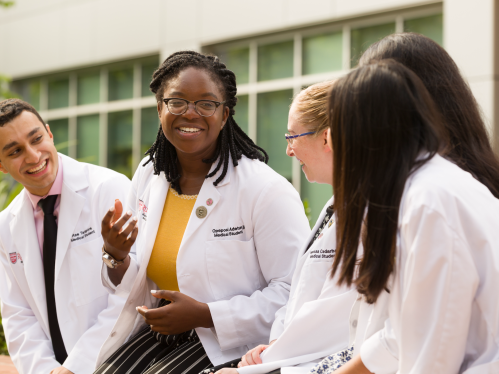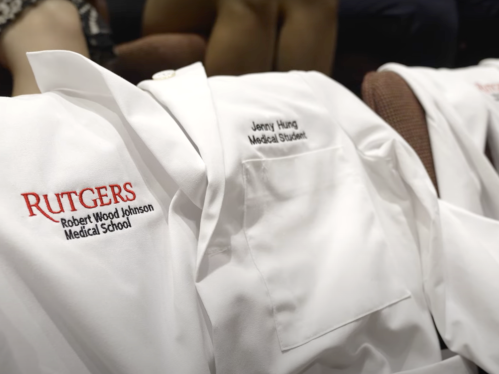Dermatology Residency
Overview of the Program
The Dermatology Residency at the Robert Wood Johnson Medical School offers a three-year residency program accredited by the ACGME. We started our program in response to the need for an academic department in central New Jersey, the shortage of dermatologists in the United States, and the relative shortage of dermatologists in this part of the state. We currently accept one resident per year.
The focus of the program is mainly on clinical dermatology designed to allow the residents to develop a high degree of competence, experience and confidence. We have a very busy outpatient dermatology clinic, where most patients whether they have private insurance, managed care, charity care or are paying “out of pocket”, are seen by the dermatology residents.
This page will provide you with an overview of the residency program, as well as specifics regarding location, rotations and programs, curriculum and research. We’re pleased that you are visiting our website and we hope that you find the information in our page helpful. We welcome comments, questions, and suggestions.
Cindy Wassef, MD
Program Director Assistant Professor of Dermatology
The residents attend clinic every day except Friday afternoons which are reserved for didactic sessions. Among the clinics are specialty sessions, such as Pediatric Dermatology clinic, Patch testing clinic, and Surgery clinics (including general dermatologic surgery, cosmetic procedures, and Mohs surgery).
In addition to clinical dermatology, we emphasize the need for continued research and learning which includes our current studies and clinical research trials.
Residency and fellowship programs training at Robert Wood Johnson Medical School benefit from the resources and interprofessional opportunities available through the Rutgers Health institutional sponsorship. Learn more about all of the Rutgers Health sponsored graduate medical education programs on our sponsoring institution webpage.
Accordion Content
-
For a resident accepted into the research track in Dermatology, we are committed to providing a strong pathway for their development as a clinician and as a physician-scientist. To that end, we commit to four years of support for this 2+2 program. The majority of the first two years will be clinical; residents are encouraged to begin the groundwork for their research (for example, starting the IRB process and recruiting study subjects after IRB approval is received). Years 3 and 4 will be predominantly research-oriented to allow for the development of skills with the goal of becoming an independent investigator. We will encourage research track residents to write a grant proposal to fund part of the research effort as this enhances the career development of the candidate. Receipt of funding will be welcome but is not required in any way for our commitment to residents in this track. We also will work to mentor the residents, establishing mentoring committees that will parallel that of a PhD student so that the resident may take advantage of the collective experience. We have a cadre of outstanding basic, translational, and clinical mentors, and many research opportunities with extensive institutional research resources.
Qualified MD/DO/PHD, or MD/DO/MPH applicants are invited to apply during the 1st year of Dermatology residency (PGY-2 year). During the residency interview process, please let us know if you intend to apply for this research track so we may set up interviews with appropriate research mentors.
-
Outpatient clinical dermatology services are provided at 1 World’s Fair Drive, Somerset, NJ. The clinic measures 2,600 square feet and is contiguous with an additional 1,400 square feet of administrative space available for residents’ use. There are eight to nine half-day sessions per week, and residents spend approximately 30-35 hours in clinic each week. Residents participate in the care of all patients as there are no separate faculty and resident practices. All patient encounters are staffed by the attending physicians with no exceptions.
Specialty clinics include General Dermatologic Surgery (2 half days per week) that is attended by all residents, Pediatric Dermatology (1 half day per week) participated on by all residents, and Patch testing service assigned on a rotating basis.
Space and equipment are available for instruction in dermatologic surgery, electrosurgery, phototherapy, cryosurgery, laboratory techniques (KOH preparations, ectoparasite scrapings and Tzanck smears), application of topical medicaments and dressings, epicutaneous testing, phototesting and other diagnostic and therapeutic procedures.
The patient population in clinic is diverse, as are the conditions the residents see and treat. New Brunswick is a small city with a large African American and Latino community; thus, resident exposure to a range of skin types. We see patients who come directly to us for care, those who are referred from their primary physician, and those that are referred from dermatologists in the community.
-
The Center for Dermatology Residency Training Program at Rutgers Robert Wood Johnson Medical School requires a $75 payment for Dermatology residency verifications and reference evaluations. This fee is necessary to recover costs associated with retrieval and processing verifications and references for housestaff who attended the Department of Pathology and Laboratory Medicine Residency Training Program.
Please contact the program coordinator with the information needed to complete your verification.
Program Assistant/ Residency Program Coordinator
Aida Cardona
Office: 732-235-7765
Fax: 732-235-6568
aida.j.cardona@rutgers.edu
Payment Link for Dermatology Residency Verification
Processing can take 5-10 business days. To help expedite the process, please send a copy of your Rutgers dermatology residency certificate.
Benefits and Salary
Our residency and fellowship programs offer a uniform package of benefits consistent with those provided at all graduate medical educational programs operated by the medical school. Full details regarding benefits and salary are continuously updated by the Office of Graduate Medical Education.

Contact Us
Cindy Wassef, MD
Program Director
Assistant Professor of Dermatology
Email: wassefci@rwjms.rutgers.edu
Aida Cardona
Program Assistant/ Residency Program Coordinator
Office: 732-235-7765
Fax: 732-235-6568
Email: aida.j.cardona@rutgers.edu

